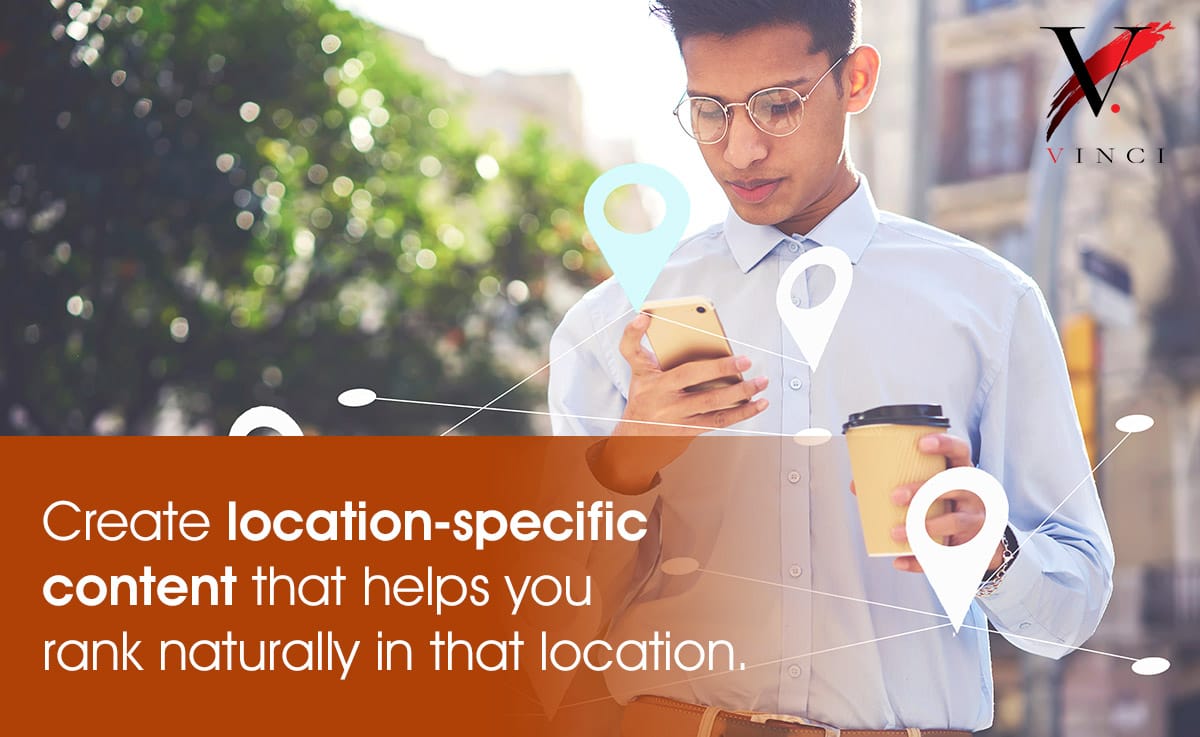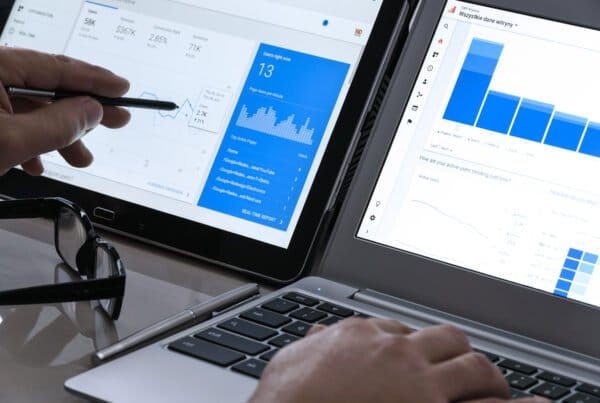As a local SEO expert, I often hear small business owners say things like, “My business is in Monterey, but I want to attract more customers from Salinas. How do I do that?” Or, “We want to attract customers not just from Carmel or those visiting Carmel Valley, but also, those from the greater Monterey, San Benito, and Santa Cruz Counties.” So how can you get your business ranking in other local cities?
We see keywords targeting a specific city all the time… “Plumber in Seaside” or “Retirement Community in Monterey.”
Ranking in multiple cities and other similar challenges is so popular; our readers deserve a thorough and detailed answer. You won’t need to be an SEO expert to grasp any of this! To help small business owners, I’ve written this blog post in simple, easy-to-digest terms so you can make sense of the complicated landscape that makes up our local search market in 2021 and apply the strategies that make the most sense for your business.
Disclaimer: Please keep in mind, Google is changing its focus and algorithm constantly. Therefore, while most of this content will remain relevant for quite some time, tactics and strategies to implement some of these best practices may shift as the local search marketing changes and new technology emerges.
Getting Started with Local SEO & Local Rankings in Search

When it comes to local SEO and getting found in local search, the number one goal for just about every business owner is to improve visibility IN the location(s) where your business resides. And while that sounds simple enough, Google ranking factors are complex. You will quickly notice that local businesses show up differently in the search results depending on the search term used, the search user’s location, as well as what type of user is inquiring (i.e., mobile versus desktop as an example), as well as a ton of other factors.
Have you ever searched the exact phrase from different locations (even in the local market) and noticed how different the search results appear?
What Makes Sense for Your Business
While targeting a different city outside of your immediate area and getting visibility in search is not impossible, it can be challenging. To improve your visibility in local search, you must understand what makes sense for your business. For example, if you run a delivery-based food business and only service Monterey, CA, it would be a wasted effort to try and get your business to rank for local searches in Salinas.
What’s Possible for Your Business
Second, you must understand what is possible. While ranking in other cities is possible, you also have to consider that you will be competing with similar businesses in that city which may not always be worth the effort.
How Do You Define Wasted Effort?
Lastly, you will need to be realistic about what is entirely out of the question.
For example, suppose a local restaurant wants to rank for local searches performed across the entire county, region, or state. In that case, it is doubtful they will accomplish this goal unless the competition is very low or the type of restaurant is so unique there are not many other options to show in the search results.
Optimizing for local searches can hurt your business’s visibility if not done well. This article will explore how to do local SEO correctly.
Why Local SEO Matters
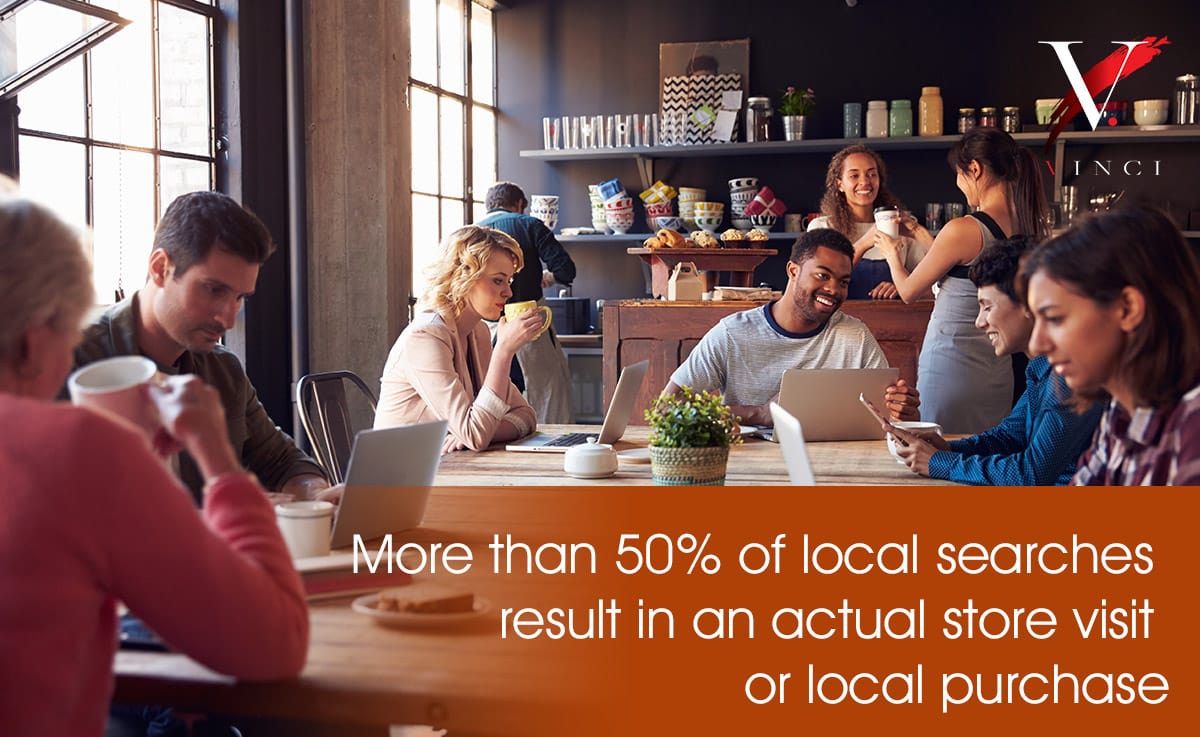
If one of the most popular questions we get asked is “how do I attract more local customers in other/multiple cities,” then the second most popular question is, “if local SEO can hurt my business, why should I try?”
First, most, if not all, local businesses want to be as visible as possible to prospective buyers in the same or neighboring city. Closing a sale with a local customer (unless you run a tourist-based business) is much easier. Developing rapport, trust, and having experience with the local market can dramatically reduce the amount of time needed to complete a transaction.
Second, when traveling outside of our immediate area or to locations unknown, how do we search for things we want to buy, the food we want to eat, or places we hope to visit? Do we simply type in “pizza,” or would you Google a location-specific keyword such as “best pizza in Monterey?” Not only are we searching with specific locations in mind, but we are also searching with the intent of purchasing, eating, or visiting these local places.
Data tells us that more than 50% of local searches result in an actual store visit or local purchase. In addition, nearly 50% of all Google searches have local intent. The impact of searches with local intent is simply too significant to ignore if you still think local SEO is not the strategy for you!
How Google Ranks Local Search Results
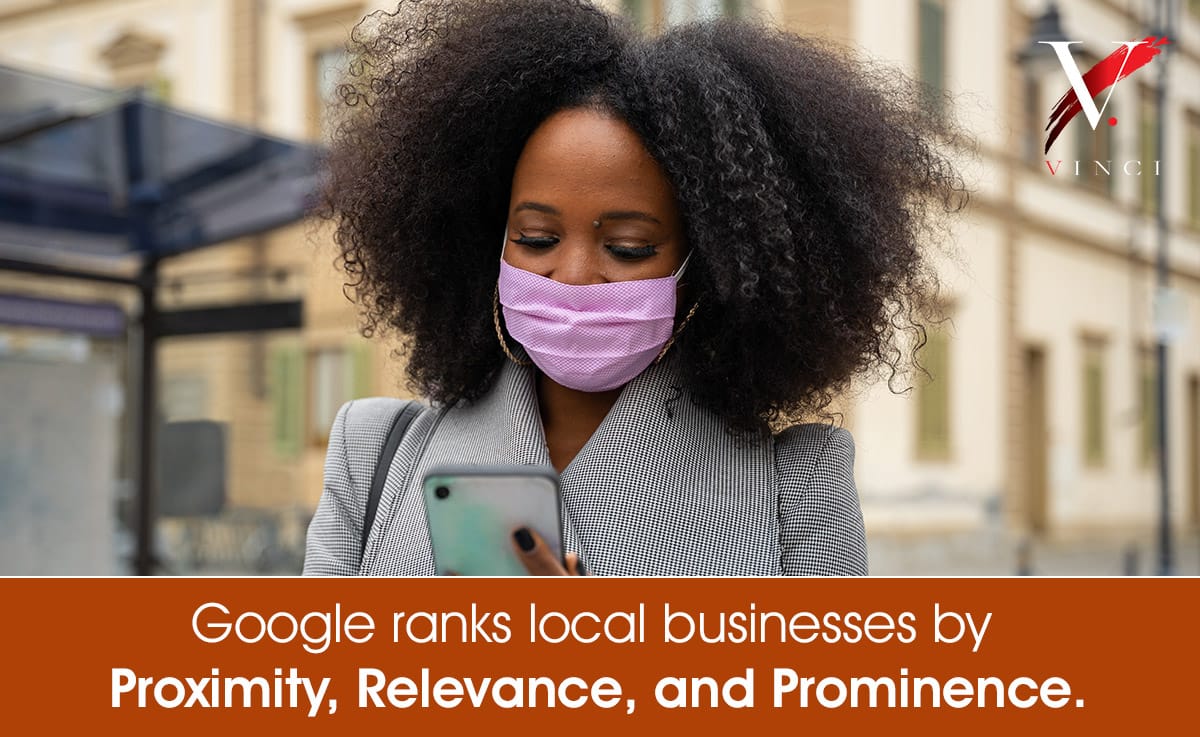
Below are brief descriptions of the three primary ranking factors for local search and how to utilize each of them when weighing your options to optimize for your local city or a neighboring community.
Google’s Local search has three primary ranking factors:
- Proximity– How close is the search user to the search results shown? Depending on the type of search Google will display results it deems relevant.
- For example, if showing you closer results would benefit you, Google would show you the closest results first, i.e., a Gas Station, Hospital, or Movie Theater.
- Relevancy –How accurately do the search results match the search query? – If you search for a fine dining restaurant in Carmel Valley, CA, the search results should show fine dining locations first (instead of fast food, etc.). Displaying a fine dining restaurant would be the most contextually relevant option based on your search.
- These search results will also factor “proximity” into the mix. If there are not many local fine dining restaurants in your area, Google may show results that are further away because your local choices are not as “relevant.”
- In this scenario, Google is assuming that when you are searching for “fine dining,” you are: A) looking for local results, and B) those results should be “fine dining restaurants,” not just food-related results that are “close by.”
- Prominence– How well-known is your local business? – Business locations with a greater number of backlinks, more reviews, a larger pool of website traffic, engagement on social media, and many other factors will all impact how “prominent” one location is over another.
- Prominence alone will never be the only ranking factor to show local results but typically helps shape the pecking order of which location shows up first, second, and so on.
Note: You’ll notice that having the most reviews in your Google My Business listing does not always ensure you get the top ranking spot in the local search results. Reputation is just one of many potential local ranking factors.
The majority of users performing local searches today intend to purchase or inquire about purchasing or planning an in-person visit to a local business. The algorithm is constantly changing and shifting. There is no way to know the algorithm for sure, and it will vary depending on the keywords searched and the intent behind them. Therefore, in most cases, our best guess is Google is weighing Relevancy first, Proximity second, and Prominence third.
Our best advice for improving your local rankings is to remain logical and realistic in your planning and how it may impact local visibility and SEO.
Targeting Strategy Examples
Local Results in a Specific Location
If you know that when your target audience searches in a specific location, they want to see local results for that location. Focus your optimization strategy on making sure you are as visible as possible within that area.
For example, “in-home senior care in Pebble Beach.” This search is specific to Pebble Beach, and search engines will assume you are looking for service providers in or within close proximity to that city.
When trying to attract local clientele, make sure your content is location-specific and relevant to the area. Creating location-specific content doesn’t mean keyword stuffing a hundred city names into one page. Instead, talk about the area and how it relates specifically to your business overall or a particular service.
Regional Results in Other Cities or Areas
If you are trying to target a different city or an area on the other side of town, additional factors may impact your visibility in search. For example, depending on where you search, there may be more competitors vying for the same business, larger competitors who are doing a better job with SEO or advertising, a more significant population, or less interest in your product or service, etc. All of these factors and many more will impact your rankings in search and how visible your business is within your market and others.
Even if you see fewer competitors in markets outside of your own, the simple fact your business is located somewhere other than where you are targeting will make it much more challenging to rank in these outer locations.
To rank organically in these other locations, create more content that targets these locations and make sure to optimize your Google My Business (GMB) listing, including service areas and in-depth service descriptions to help search users make an informed decision.
Tips for Better Local SEO
How to Make Your Local Google Listing Stand Out
It should be rather apparent that legitimate businesses will find greater success ranking in Google’s local search. In recent years, Google has emphasized Entity-Based SEO, which not only focuses on keywords but “context and intent” to help search users find what they need. Therefore, optimizing for local searches as best you can is critical to building a visible, credible local business.
Create a Google My Business Listing

While some conspiracy theorists have doubts, Google’s mission is simple: organize information and make it accessible to everyone searching online. To further that point, Google just wants to give search users exactly what they seek. Therefore the more verifiable and legitimate your business appears to be, the more likely people will want to select your listing over another. And it is this credibility that will make Google more likely to rank you higher in search than a competitor.
Not only is Google My Business (GMB) free, but by verifying businesses before allowing their listings to go live, Google empowers local searchers to choose with a higher degree of confidence.
When creating a listing, be as complete and thorough as you possibly can. Rich listings include name, address, phone, photos, description, website address, service areas, services or products offered, and much more. Any information you leave off is an opportunity for your competitor to outshine your business.
Improve Your Position in the Local Map Pack
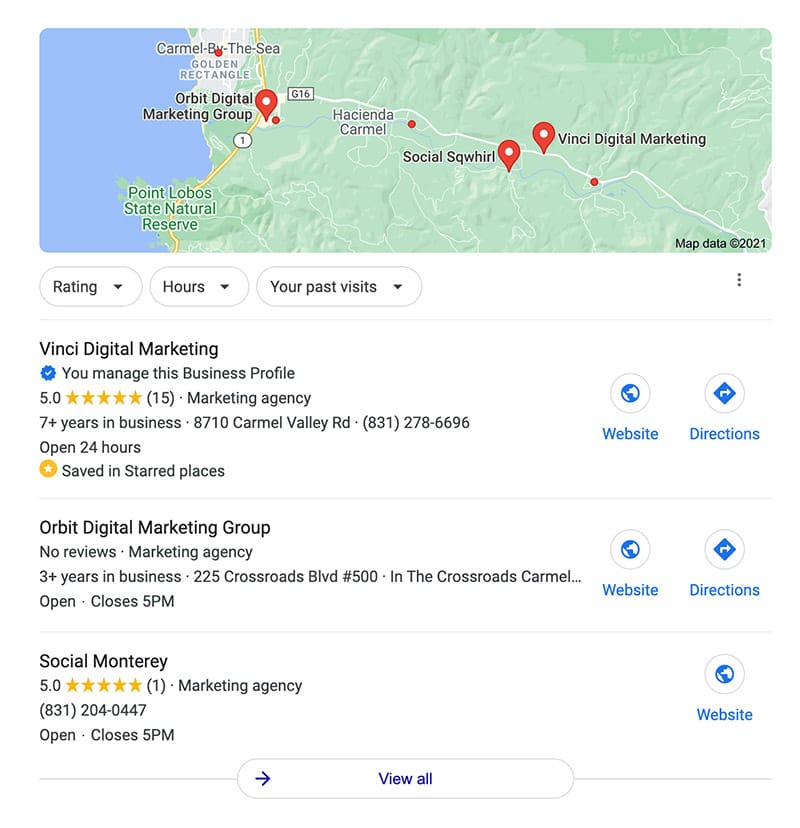
When doing a local search, you’ve probably noticed the two or three suggestions along with the local map at the top of the search results. This area is prime real estate. The businesses consistently found in the local map pack are reaping the majority of engagement with search users for that particular query.
To improve your chances of ranking in the local map pack, make sure you have completed your GMB listing in its entirety. In addition, make sure to work on your public-facing reputation by asking clients to leave reviews on your GMB listing. The more positive reviews you receive, the higher your chances of being featured in Google’s local map pack.
Note: it is not a best practice to solicit or pay for reviews. Google is highly vigilant about reviews that may violate their policies and penalize your GMB page and website in certain situations.
Improve Your Website’s Internal Linking
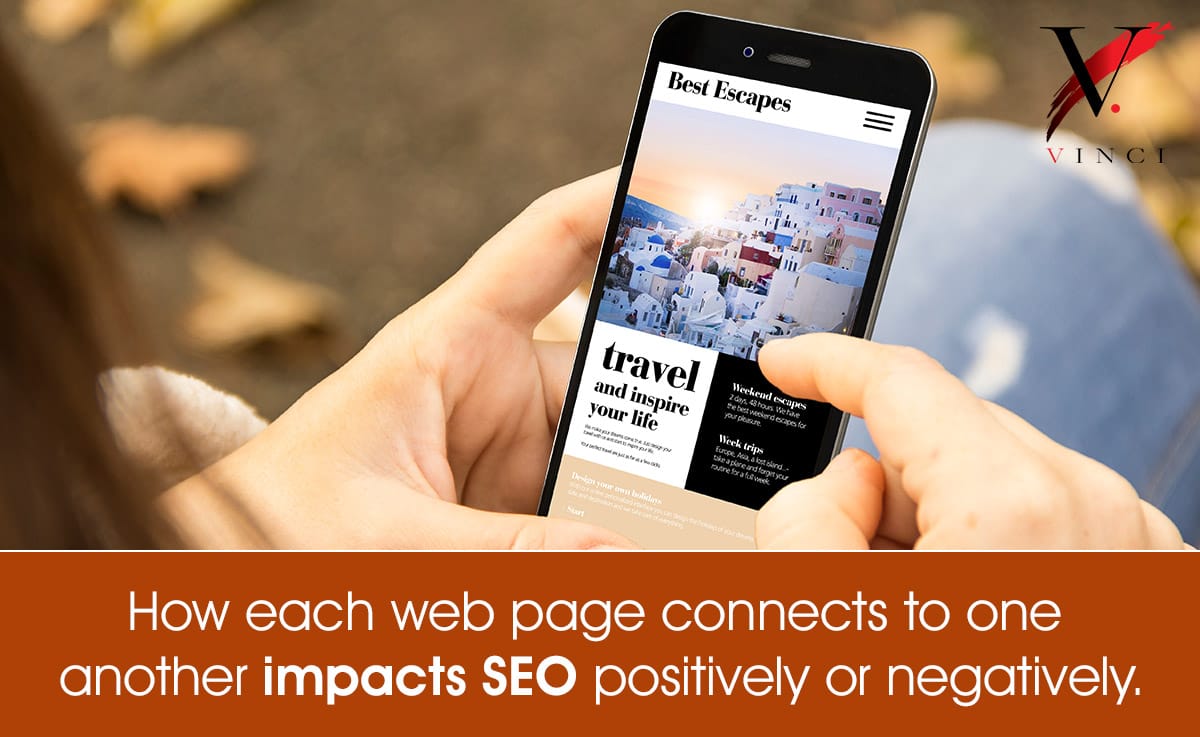
Your site’s construction and how each page connects to one another can positively and negatively impact SEO. Improve your website navigation and make sure all pages accessible by site visitors are part of the site navigation.
Also, make sure to highlight or emphasize the most important pages, so Google can better understand your site structure.
Lastly, create an XML sitemap and upload it to Google’s Webmaster Tools. Sitemaps help Google get a clear picture of your website’s navigation structure and how every page is interconnected.
Build Local Citations (Directory Listings)
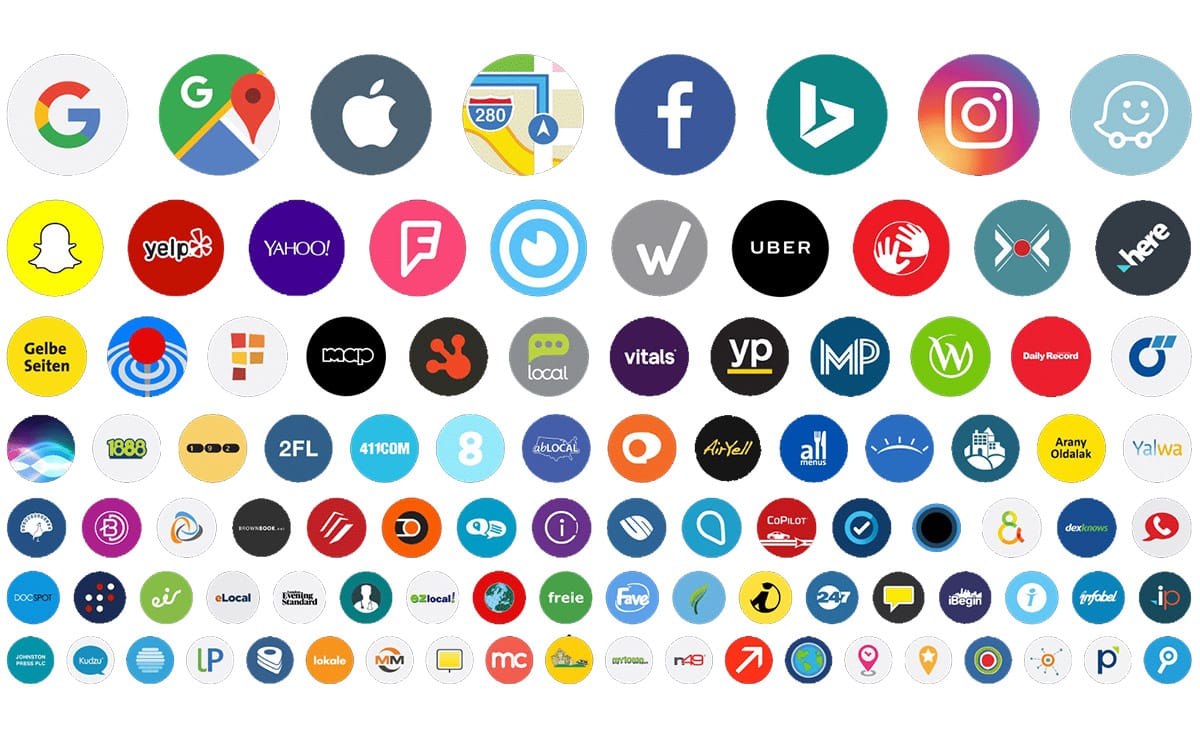
While most of what we’ve mentioned is Google-specific, creating business listings on other platforms is also critical to better visibility in local search. While there are thousands of directory sites, most of them collect business location data from a small number of sites. The majority of these sites are called online data aggregators, which is just a fancy word for sites that automatically compile information to share with a multitude of sources.
Have you ever found a business listing on a random website that you did not create? Yup! That’s an online data aggregator. The challenge with this technology is pulling your critical business information, such as name, address, phone, website, etc., from outdated or unreliable sources. This data could be published on hundreds if not thousands of websites.
Therefore, the best defense is offense! Take the time to create as many business listings on credible websites as possible. Some critical sites for most businesses would be:
Creating or claiming these listings is a tedious process but worthwhile if improving local visibility matters to your business. You might be wondering, “how do these listings impact my rankings in Google’s local search.” The “worldwide web” is called a web for a reason. Everything is interconnected! The better signals you can send to search engines like Google and Bing that you are a credible business with accurate and complete business information across all the major directories, the higher your chances of outranking competitors.
Note: if you want to learn more about local directory listings and an easy and effective way to manage them, check out our Local SEO service. One portal, one login to manage every critical directory on the web!
Optimize for Mobile
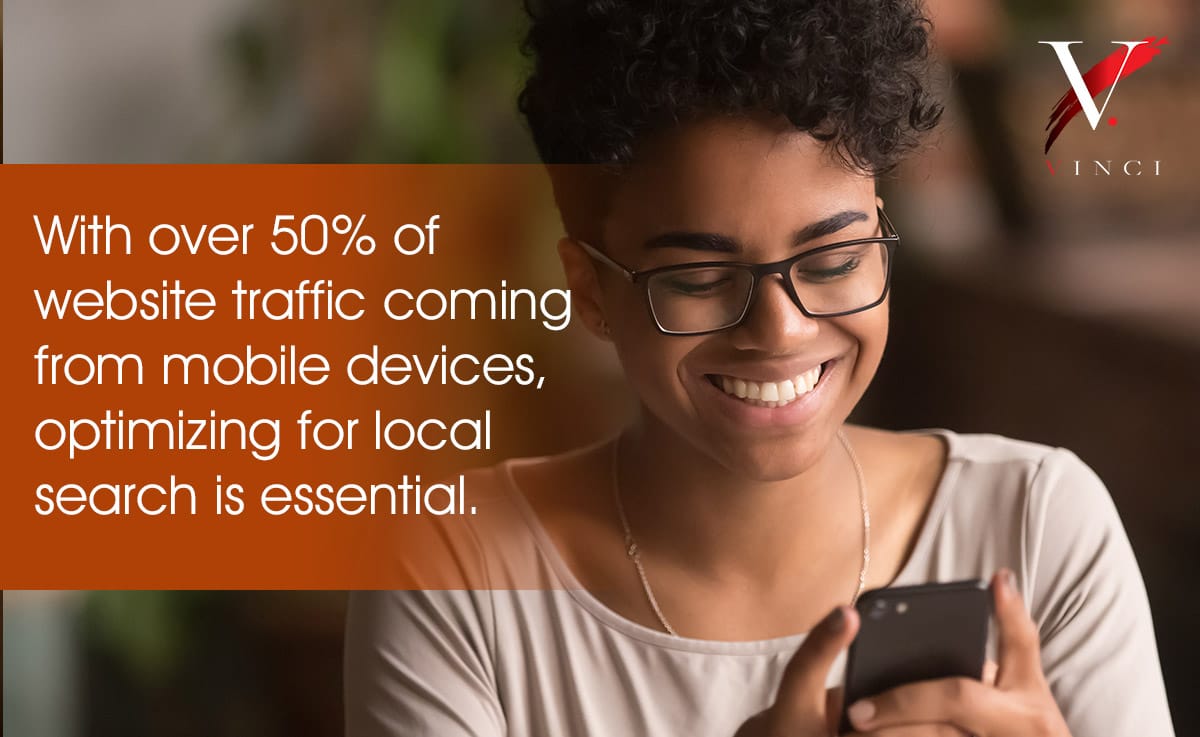
In 2015, Google began to emphasize the importance of a mobile-friendly website. Later, they split the search index in two and began ranking search results differently on mobile devices than desktop devices. This distinction for mobile-based searches means Google implements additional ranking factors to rank your website in the search results if done on a mobile device.
Websites that are not mobile-friendly may not show up at all in the mobile search results or with less frequency (and with a lower-ranking position) because of Google’s lack of trust in the quality of the website, among many other factors.
The majority of users performing local searches intend to purchase or visit a local business soon. With well over 50% of all website traffic (in most cases) coming from mobile devices, optimizing for mobile is critical to ensuring visibility in local searches. The importance of mobile optimization is abundantly clear in the case of emergencies. If your daughter is sick in the middle of the night and you need an emergency doctor or a pipe bursts in your home and your basement floods, how would you choose to search? From your phone or your computer? Nearly everyone would say the phone.
Abundance May Be All Around You

For a small, local business, it’s easy to look at your dwindling sales and assume you’ve exhausted your local market. The only logical next step is to look elsewhere for new business. However, in our two decades of digital marketing experience, 95% of the time, business owners have not explored all options available to them to maximize visibility in the local market. The abundance you seek may already be in your backyard!
Optimizing your local listings and website and targeting specific areas with location-specific content will help drive more local customers to your door.
Would you like to learn more about Local SEO and how to improve visibility in your neighborhood? The local SEO team at Vinci Digital can help explore every option available to you. Contact Us to get started.
What struggles are you having with local visibility in search?
How has that impacted your business?
Leave us a comment below.


